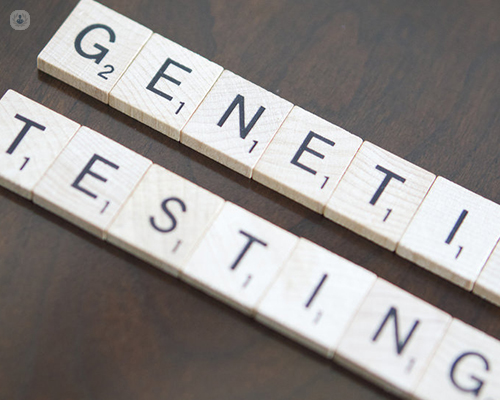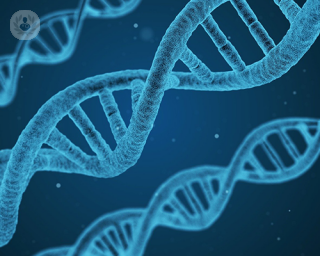What is genetic testing?
Genetic testing is a tool that is used to find out whether a person is carrying a specific altered (mutated) gene that causes a particular medical condition such as a disease.

What are the different types of genetic testing?
The different types of genetic testing and their purpose include:
- Diagnostic genetic testing – to diagnose a person with a genetic condition. It can determine cystic fibrosis or Huntington’s disease.
- Predictive genetic testing – to work out the chances of a person developing a genetic disease before they have symptoms. This is usually when the medical condition runs in the family. This can be useful for determining a risk of certain types of colorectal cancer.
- Preimplantation testing – this is used when attempting to conceive a child through in vitro fertilisation (IVF), as the embryos are screened for genetic abnormalities. The embryos without abnormalities are implanted into the uterus.
- Prenatal testing – to find a genetic disease in an unborn baby’s genes. Down syndrome and Trisomy 18 syndrome are two disorders that are screened for during prenatal genetic testing. This is done by looking at markers in blood. Newer testing called cell-free DNA testing can sample the baby’s DNA using a blood test on the mother.
- Newborn screening – this is offered for babies in their first six to eight weeks. For babies with health problems the benefits are enormous as newborns are tested for certain genetic and metabolic abnormalities that can cause certain conditions.
- Carrier testing – the patient is advised to have this test before having children if they have a family history of a genetic disorder, such as a sickle cell anaemia or cystic fibrosis. Some ethnic groups have a higher risk of some genetic disorders.
- Pharmacogenetics – this may help determine what medication and dosage would be most effective if someone has a health condition or disease.
How are genetic tests made?
There are different way to test, which collects samples that will be sent to a lab for analysis. These include:
- Blood sample
- Cheek swab
- Amniocentesis – used for prenatal genetic testing, a thin needle is inserted through the abdominal wall into the uterus to sample the amniotic fluid.
- Chorionic villus sampling – also used for prenatal testing, the doctor takes a sample from the placenta.
What is genetic counselling?
Genetic counselling provides support, information and advice to those who have been referred to a genetic counsellor by their doctor. A healthcare professional will discuss the health condition that runs in the family and how it may be affecting the patient and their family.
The counsellor will discuss the risk of a couple passing on an inherited condition to their child and offer support if the patient wants to have another child. The counsellor can also discuss the different types of genetic testing, including the risks and benefits of each.
11-13-2013 11-05-2024Genetic testing
Dr Melita Irving - Clinical genetics
Created on: 11-13-2013
Updated on: 11-05-2024
Edited by: Karolyn Judge
What is genetic testing?
Genetic testing is a tool that is used to find out whether a person is carrying a specific altered (mutated) gene that causes a particular medical condition such as a disease.

What are the different types of genetic testing?
The different types of genetic testing and their purpose include:
- Diagnostic genetic testing – to diagnose a person with a genetic condition. It can determine cystic fibrosis or Huntington’s disease.
- Predictive genetic testing – to work out the chances of a person developing a genetic disease before they have symptoms. This is usually when the medical condition runs in the family. This can be useful for determining a risk of certain types of colorectal cancer.
- Preimplantation testing – this is used when attempting to conceive a child through in vitro fertilisation (IVF), as the embryos are screened for genetic abnormalities. The embryos without abnormalities are implanted into the uterus.
- Prenatal testing – to find a genetic disease in an unborn baby’s genes. Down syndrome and Trisomy 18 syndrome are two disorders that are screened for during prenatal genetic testing. This is done by looking at markers in blood. Newer testing called cell-free DNA testing can sample the baby’s DNA using a blood test on the mother.
- Newborn screening – this is offered for babies in their first six to eight weeks. For babies with health problems the benefits are enormous as newborns are tested for certain genetic and metabolic abnormalities that can cause certain conditions.
- Carrier testing – the patient is advised to have this test before having children if they have a family history of a genetic disorder, such as a sickle cell anaemia or cystic fibrosis. Some ethnic groups have a higher risk of some genetic disorders.
- Pharmacogenetics – this may help determine what medication and dosage would be most effective if someone has a health condition or disease.
How are genetic tests made?
There are different way to test, which collects samples that will be sent to a lab for analysis. These include:
- Blood sample
- Cheek swab
- Amniocentesis – used for prenatal genetic testing, a thin needle is inserted through the abdominal wall into the uterus to sample the amniotic fluid.
- Chorionic villus sampling – also used for prenatal testing, the doctor takes a sample from the placenta.
What is genetic counselling?
Genetic counselling provides support, information and advice to those who have been referred to a genetic counsellor by their doctor. A healthcare professional will discuss the health condition that runs in the family and how it may be affecting the patient and their family.
The counsellor will discuss the risk of a couple passing on an inherited condition to their child and offer support if the patient wants to have another child. The counsellor can also discuss the different types of genetic testing, including the risks and benefits of each.

Have you had genetic testing and don’t know what the results mean?
By Dr Melita Irving
2025-01-12
Genetic testing is becoming somewhat of a fad, with skincare companies offering products based on your genetic makeup, and even wine companies matching your DNA to your ideal tipple. But are these tests really reliable? Clinical geneticist Dr Melita Irving breaks it down for us. See more


Genetic testing: an exploration
By Professor Anand Saggar
2025-01-12
In the vast landscape of medical advancements, genetic testing emerges as a beacon of precision and foresight, offering individuals a glimpse into their own unique genetic makeup. Highly experienced consultant geneticist Dr Anand Saggar explores the fundamentals of genetic testing, its applications, and what it means for you, the patient. See more


Prenatal screening tests: are they accurate?
By Dr Melita Irving
2025-01-10
Genetic screening is designed to give reassurance to those hoping to have a child. Unlike genetic testing, genetic screening is done 'blind' and without any indication of a potential genetic disorder being passed to a child. Clinical geneticist Dr Melita Irving explains prenatal screening and clarifies it's accuracy. See more


Genetic testing for management of breast cancer
By Mr Sumohan Chatterjee
2025-01-10
Genetic testing for breast cancer can assist in estimating the chance of developing it. Plus, it can help to alter and personalise breast cancer treatment for the patient. Mr Sumohan Chatterjee, leading oncoplastic breast surgeon in Greater Manchester and Wilmslow, speaks to Top Doctors all about genetic testing in breast cancer management. He goes into expert detail about its role, benefits and drawbacks and what factors when deciding to offer testing to a patient with breast cancer, should be considered. See more
Experts in Genetic testing
-
Professor Anand Saggar
Clinical geneticsExpert in:
- Chromosomal abnormalities
- Genetic disorders
- Genetic testing
- Breast cancer
- Developmental delay
- Huntington's disease
-
Dr Melita Irving
Clinical geneticsExpert in:
- Developmental delay
- Genetic disorders
- Achondroplasia
- Skeletal dysplasia
- Genetic testing
-
Dr Antonis Pantazis
CardiologyExpert in:
- Cardiomyopathy
- Ventricular tachycardia
- Echocardiogram
- Genetic testing
- Heart failure
- Pericarditis
-
Dr James Mackay
Medical oncologyExpert in:
- Cancer
- Genetics of cancer
- Breast cancer
- Family history of breast cancer
- Genetic testing
- Genetic Counseling (hereditary cancer)
-
Dr Jay Naik
Medical oncologyExpert in:
- Breast cancer
- Immunotherapy
- Chemotherapy
- Genetic testing
- Personalised medicine
- Targeted therapy
- See all

The Wellington Hospital - part of HCA Healthcare
The Wellington Hospital - part of HCA Healthcare
Wellington Hospital South Bldg, 8A Wellington Pl, NW8 9LE
No existe teléfono en el centro.
By using the telephone number provided by TOP DOCTORS, you automatically agree to let us use your phone number for statistical and commercial purposes. For further information, read our Privacy Policy
Top Doctors

The Harley Street Clinic - part of HCA Healthcare
The Harley Street Clinic - part of HCA Healthcare
35 Weymouth Street, London. W1G 8BJ
No existe teléfono en el centro.
By using the telephone number provided by TOP DOCTORS, you automatically agree to let us use your phone number for statistical and commercial purposes. For further information, read our Privacy Policy
Top Doctors

108 Harley Street Medical
108 Harley Street Medical
108 Harley Street, W1G 7ET
No existe teléfono en el centro.
By using the telephone number provided by TOP DOCTORS, you automatically agree to let us use your phone number for statistical and commercial purposes. For further information, read our Privacy Policy
Top Doctors
-
The Wellington Hospital - part of HCA Healthcare
Wellington Hospital South Bldg, 8A Wellington Pl, NW8 9LE, Central LondonExpert in:
- Digestive
- Cardiology
- Orthopaedic surgery
- Orthopaedic spinal surgery
- Intensive care
- Spine
-
The Harley Street Clinic - part of HCA Healthcare
35 Weymouth Street, London. W1G 8BJ, Central LondonExpert in:
- Cancer
- Head and neck cancer
- Cardiology
- Intensive care
- Diagnostic Imaging
- Women’s health
-
108 Harley Street Medical
108 Harley Street, W1G 7ET, W1G Marylebone LondonExpert in:
- Vascular Surgery
- Dermatology
- Diagnostic Imaging
- Women’s health
- Sports Medicine
- Rehabilitation
- See all
- Most viewed diseases, medical tests, and treatments
- Menopause support
- Immunotherapy
- Tubal factor infertility
- Electrophysiology study
- PGT-A
- Visual impairment
- Diabetic retinopathy
- Retina
- Presbyopia
- Nystagmus







